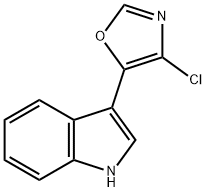Streptochlorin is a bacterial metabolite originally isolated from Streptomyces sp. SF2583 that has diverse biological activities, including antiangiogenic, antiproliferative, and anti-allergic properties. It inhibits TNF-α-induced NF-κB transcriptional activity and decreases proliferation of human umbilical vein endothelial cells (HUVECs) when used at concentrations ranging from 5 to 20 μM. Streptochlorin (12 μg/ml) decreases viability of, as well as induces apoptosis and increases the production of reactive oxygen species (ROS) in, Hep3B human hepatocellular carcinoma cells. It does not induce cytotoxicity in RBL-2H3 mast cells at concentrations up to 100 μM. Streptochlorin prevents degranulation in antigen-stimulated mast cells, as well as inhibits Syk kinase and the Src family kinases LYN and Fyn and reduces the secretion of TNF-α and IL-4 induced by dinitrophenyl-human serum album (DNP-HSA) in RBL-2H3 mast cells. It also decreases swelling and reduces scratching behavior in a mouse model of allergic dermatitis induced by dinitrofluorobenzene (DNFB).

